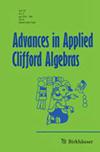机器学习发现辫子和扁平辫子的不变量
IF 1.2
2区 数学
Q2 MATHEMATICS, APPLIED
引用次数: 0
摘要
我们利用机器学习将辫子(或扁平辫子)的示例分类为琐碎或非琐碎。我们的机器学习采用监督学习的形式,特别是多层感知器神经网络。当它们在分类中取得良好结果时,我们能够将其结构解释为数学猜想,然后将这些猜想证明为定理。因此,我们找到了辫子的新不变式,并证明了与之相关的几个定理。这项工作源于我们探索不同类型的人工智能如何处理三股辫子的实验,这也是我们主要关注三股辫子的原因。本文章由计算机程序翻译,如有差异,请以英文原文为准。

Machine Learning Discovers Invariants of Braids and Flat Braids
We use machine learning to classify examples of braids (or flat braids) as trivial or non-trivial. Our machine learning takes the form of supervised learning, specifically multilayer perceptron neural networks. When they achieve good results in classification, we are able to interpret their structure as mathematical conjectures and then prove these conjectures as theorems. As a result, we find new invariants of braids and prove several theorems related to them. This work evolves from our experiments exploring how different types of AI cope with untangling braids with 3 strands, this is why we concentrate mostly on braids with 3 strands.
求助全文
通过发布文献求助,成功后即可免费获取论文全文。
去求助
来源期刊

Advances in Applied Clifford Algebras
数学-物理:数学物理
CiteScore
2.20
自引率
13.30%
发文量
56
审稿时长
3 months
期刊介绍:
Advances in Applied Clifford Algebras (AACA) publishes high-quality peer-reviewed research papers as well as expository and survey articles in the area of Clifford algebras and their applications to other branches of mathematics, physics, engineering, and related fields. The journal ensures rapid publication and is organized in six sections: Analysis, Differential Geometry and Dirac Operators, Mathematical Structures, Theoretical and Mathematical Physics, Applications, and Book Reviews.
 求助内容:
求助内容: 应助结果提醒方式:
应助结果提醒方式:


